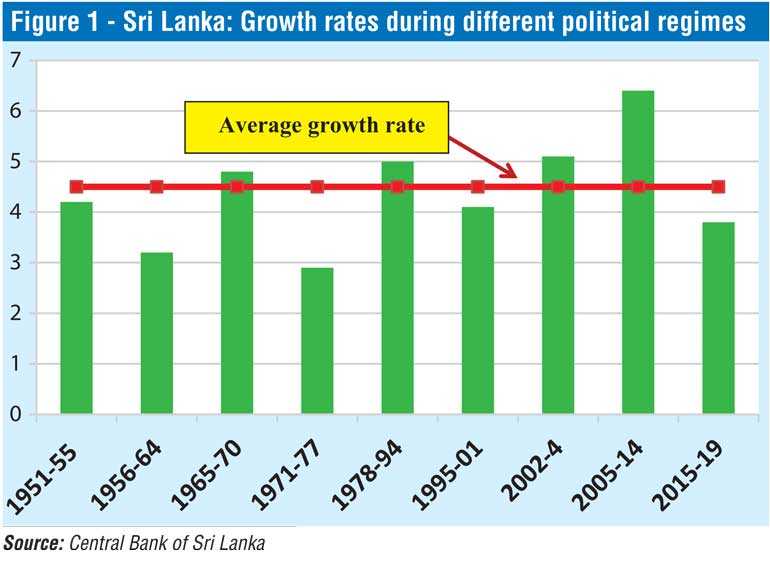Wednesday Feb 25, 2026
Wednesday Feb 25, 2026
Monday, 23 September 2019 00:43 - - {{hitsCtrl.values.hits}}

It is not a tough man who would save Sri Lanka at the present juncture of its development. It is a democratic man who would observe the Rule of Law and protect property rights of people so that the latter would have all the incentives to work hard, invest and enjoy the fruits of their investments

The rising demand for a dictator
Recently, a former CEO of a leading private company expressed his personal view to me of the type of the ruler whom Sri Lanka should have today. Driven by conviction, he said that Sri Lanka at the present juncture needed a dictator to rule the country. He presented his reasons for this suggestion. All the top leaders of the country today, according to him, have disappointingly failed the nation. They have promised so many good things to the electorate when they sought power at elections. But, once in power, those promises had been kept in abeyance.
The list was long, but he mentioned some of the key promises that had been broken. Among them were the promises to take those who had been accused of committing acts of corruption to courts, abolish executive presidency, establish a ‘rule of law based government system’, and revert to good governance practices. Hence, the ex-CEO had been an angry man. His anger had made him rationalise that the problem had been due to the softness of the people in power.
He presented evidence from the region where tough administrations had been successful in delivering the promises. In Singapore, Lee Kuan Yew had been a tough ruler though he had been elected to power through elections. In South Korea, General Park had seized power through a coup d’état. He is said to have used his military prowess to enforce discipline on otherwise undisciplined South Koreans. The results had been dramatic. Within a single generation, both countries had been able to elevate themselves to the status of rich countries. Hence, the golden path to economic prosperity, according to the ex-CEO, was to have an authoritarian rule. 
A nation blaming all others for indiscipline
This ex-CEO is not alone in canvassing for a dictator. Speak to any Uber or a PickMe driver or a three-wheeler operator. He would agitate for a tough man to enforce road discipline on all other road users implying that his driving is free from blame. There are many others who belong to this club of dictator loving citizens. Their concern has been the widespread indiscipline that has engulfed the whole of Sri Lanka’s society. To prove their point, they usually quote the perilous state of Sri Lanka’s state universities and hospital system as examples.
State university system is more closed than open
In the case of state universities, education is disrupted by unruly elements at all times. First, it is the ragging of the fresh students by seniors in the most inhuman way as the published reports have revealed. It has killed the creativity of a generation and made them puppets that could be manipulated at will by their handlers. When the university administration takes disciplinary action against the culprits, students at the university in question start boycotting classes alleging that students are being hunted by rulers. It paralyses the working of the university. It does not stop there and soon, it spreads to other universities too. Eventually, the whole university system comes to a standstill.
Once this issue is resolved, always in a way to appease the striking students, the non-academic staff members of universities go on strike claiming that there are unresolved issues relating to salary anomalies or promotions. When they are appeased, the academic staff takes their place.
Thus, in a given year, the state universities are closed for most of the time. The end result is that a student who enters a state university does not know when he would graduate. In other countries, dates of graduation ceremonies are fixed well in advance and students can prepare their future career plans accordingly.
Even the students who have passed out from universities regularly disturb the society’s peace. They march in the busy streets of the city demanding government jobs. It creates traffic jams, on one side, and forces the Police to use physical power to disperse them, on the other. The ultimate casualty is the general public who can only curse themselves for their disability to do anything and the political masters who do nothing about it.
Hospitals can be paralysed just by raising a threatening finger
The state hospital system is not better than state universities in this sense. Government Medical Officers’ Association, commonly known as GMOA, is noted for hitting the hospital authorities with unannounced flash strikes. Their action paralyses the hospital system putting the low income classes which do not have enough means to patronise private hospitals to innumerable hardships.
When GMOA is not on strike, nurses or other support staff members go on strike paralysing the state hospital system again. The victims in this case are patients who, by civilised society’s moral standards at all times, deserve urgent attention of healthcare authorities. That is why civilised societies give priority to ambulances that carry patients to hospitals. Similarly, prisoners of war who are injured are also treated humanely by civilised societies.
Political leaders pay lip service to indiscipline
These are just two examples out of many such occurrences which Sri Lankans experience daily. When they occur, no solution is offered by the country’s political leadership. In a democracy, political leaders have to listen to the pulse of the people if they want to continue to be in politics. Hence, through fear of losing the vote base, political leadership just keeps a blind eye on the violators of laws. The aggrieved citizens then dream of salvation via a tough guy placed at the helm of the nation. There are also diverse suggestions to bring the tough guy to power. Some want to elect him to power through popular ballot. The others want to bring him to power via a military coup. Some others suggest that the two main political forces should get together and establish a tough rule in the country. But, all these alternative suggestions have one feature in common. That is, the authoritarian ruler should rule the country for a given period, restore discipline and good behaviour and then hand over the power back to civilians.
Suffering from confirmation bias and availability bias
Those who agitate for a dictator seem to suffer from two types of bias. One is the confirmation bias. The other is the availability bias.
When one is suffering from confirmation bias, he is just looking for evidence to confirm his view. Any evidence that does not support his view is simply filtered out. In the case of availability bias, one makes judgments based on only the evidence available. No attempt is made to find out whether additional evidence, supporting or opposing, is available.
Any mission on searching for additional evidence is costly in terms time, money and mental energy. Hence, in order to avoid these costs, one would confine oneself to a narrow view constrained by limited evidence collected. As a result, the decisions made by using limited evidence are not the best decisions but somewhat suboptimal ones. When one narrates these suboptimal decisions ad infinitum, in line with the Goebbels Law, one tends to believe it as the truth. Hence, when the virtues of a dictator are repeated, people tend to believe in the miracles these dictators can deliver to a nation.
There are hundreds of failures as against two success stories
The two success stories pertaining to Singapore and South Korea, often quoted to justify authoritarian regimes, suffer from both the confirmation bias and the availability bias. For a handful number of such success stories, there are hundreds of failures which the promoters of authoritarian rules have disregarded.
Some stories are direct military dictatorships, while some others are democratically elected rulers establishing authoritarian regimes midway through. Some are monarchies, while some others are dictatorships based on personality cults. There are also single party dictatorships that do not permit pluralistic views among citizens. These failures significantly outnumber the claimed success stories. As such, one should be careful in making a recommendation for establishing an authoritarian regime based on a few selected success stories.
Dictators have not delivered prosperity to their people
In Africa, the Dark Continent, the failed dictatorships are found in Angola, Burundi, Cameroon, The Central African Republic, Chad, Congo, Eritrea, Ethiopia, Gabon, Rwanda, Somalia, Sudan and Western Sahara.
In Latin America, the countries like Equatorial Guinea, Nicaragua, Cuba and Venezuela had authoritarian regimes but they have failed to deliver economic prosperity to their people. In Asia, North Korea, Kazakhstan, Tajikistan and Turkmenistan had established similar authoritarian rules but have become economic failures despite the vast endowments of natural resources.
The two success stories pertaining to Singapore and South Korea, often quoted to justify authoritarian regimes, suffer from both the confirmation bias and the availability bias. For a handful number of such success stories, there are hundreds of failures which the promoters of authoritarian rules have disregarded.
Some stories are direct military dictatorships, while some others are democratically elected rulers establishing authoritarian regimes midway through. Some are monarchies, while some others are dictatorships based on personality cults. There are also single party dictatorships that do not permit pluralistic views among citizens.
These failures significantly outnumber the claimed success stories. As such, one should be careful in making a recommendation for establishing an authoritarian regime based on a few selected success stories.
The best example of one-party rule leading to total economic collapse was the former Soviet Union. Its economic maladies had been hidden from the rest of the world for nearly seven decades. But when it collapsed in 1989, overnight, the previously glorified Soviet Union became a developing country.
All these countries have been branded as failed states by the US based Fund For Peace. Hence, a dictatorship or an authoritarian rule is not the secret for economic prosperity for a nation.
Failure of Indira Gandhi’s draconian rule
In neighbouring India, Prime Minister Indira Gandhi established what the analysts have branded as a draconian rule after she won elections in 1971. This culminated in a highly authoritarian rule after she brought the whole country under emergency rule in 1975.
India’s economic performance during this period had been pitifully low compared to previous periods. Economic growth which amounted to 5.2% in 1971 fell to 1.8% in 1972 and became negative 1.5% in 1973. There was a slight recovery of growth to 5% in 1974, but it fell again to 0.9% in 1975. The average growth for the whole period just amounted to a little over 2% compared to an average growth of close to 4% between 1956 and 1974.
Thus, the draconian rule established by Indian political leadership through its Parliamentary majority did not help the country to deliver economic prosperity to its people.
Sirimavo Bandaranaike government didn’t do better
A parallel could be found in Sri Lanka too during 1971-77 when the United Front led by Sirimavo Bandaranaike got a two-third majority in Parliament in the July 1970 General Elections. After the abortive JVP insurrection of 1971, the country was ruled continuously under emergency laws.
These laws were used by the Sirimavo Bandaranaike government to suppress personal freedoms of people to the maximum. Yet, as the figure 1 shows, the economy suffered heavily during this period in which the average growth fell from the previous 4.8% to 2.9%, the lowest such growth attained by any political regime since independence.
Winners and losers coming from the same cultural background
What this means is that an authoritarian regime is not necessarily the gateway for a country to become prosperous. A few countries, like the most often quoted Singapore and South Korea, have succeeded, while many others have failed. Even in the case of Korean Peninsula, South Korea has been a winner in the economic race, while North Korea has been a loser. This is despite that South Korea had had an authoritarian regime in the initial phase of its economic development, while South Korea has had such a regime throughout.
Both had the same cultural and historical background but one moved up in the ladder, while the other pushed itself down. Hence, the secret to success has not been the existence of authoritarian regimes but some other growth inducing factors. Without these factors, neither democratic nor authoritarian regimes can deliver prosperity to a nation.
Importance of observing the Rule of Law and protecting property rights
The foremost of these factors is the protection of property rights, supported by the observance of the rule of law by a country. Both Indira Gandhi and Sirimavo Bandaranaike regimes failed because they violated the property rights in a background of gross neglect of the need for observing the Rule of Law. Gandhi nationalised banks, imposed draconian restrictions on the production plans of private companies, centralised the management of the economy and failed in investing in human capital during her tenure ruled under emergency.
Similarly, Bandaranaike too went on a free nationalisation spree from plantations to even producing of ‘buryani’, a kind of a delicate rice meal cooked with meat, established the most stringent export and import control regimes and killed the private initiatives by over-expanding the state sector. Both South Korea and Singapore, the two success stories, protected the property rights of people so that the private sector had all the incentives to invest and expand production.
Track record of Ranil Wickremesinghe government
As the Figure 1 shows, the economic performance of Ranil Wickremesinghe government of 2015-19 has not been impressive either, despite it being a more democratically oriented regime. The main reasons for this low performance have been the inadequate economic management, on one side, and the disregard of the Rule of Law, on the other.
In the case of economic management, instead of adopting an economy-wide national plan, all economic decisions were taken by a small group that met under Prime Minister’s leadership in an informal arrangement called Cabinet Committee on Economic Management or CCEM. This outfit is known for addressing fire fighting micro issues rather than looking at the economy from a macro perspective. With regard to the Rule of Law, as revealed by the evidence placed before the Presidential Commission into the infamous Treasury bond scam, there had been some sections in society which had been beyond the reach of the long arm of the law. In that situation, the private businesses got scared to go for worthwhile long term investments.
Demand a ruler who will observe Rule of Law and protect property rights
Hence, it is not a tough man who would save Sri Lanka at the present juncture of its development. It is a democratic man who would observe the Rule of Law and protect property rights of people so that the latter would have all the incentives to work hard, invest and enjoy the fruits of their investments.
(The writer, a former Deputy Governor of the Central Bank of Sri Lanka, can be reached at [email protected].)